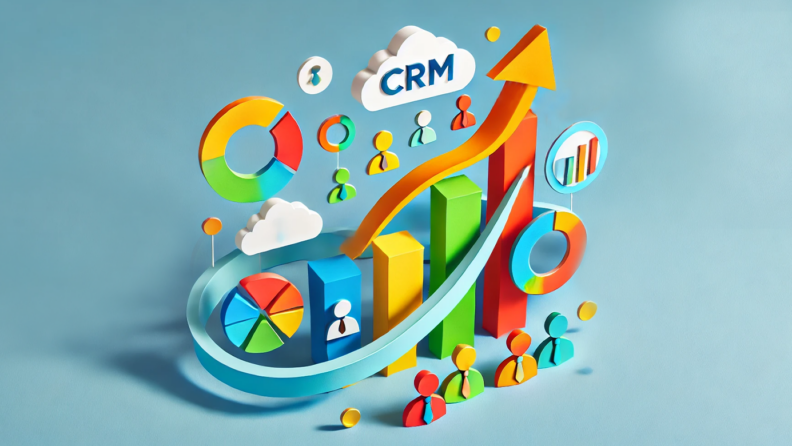In 2025, Customer Relationship Management (CRM) is poised for some thrilling changes. With the rapid rise of generative AI, shifting business dynamics, and an increasing focus on post-sales support, CRM is evolving to be faster and more flexible.
The future is about creating more innovative, efficient, and customer-centric experiences. As new trends emerge and CRM vendors race to stay ahead, we’re about to see significant shifts in how businesses manage customer relationships and experiences beyond the sale.
Generative AI: The Game Changer For CRM
At the heart of this transformation is generative AI, which is already reshaping CRM systems.
Imagine a CRM platform that doesn’t just log data but also drafts personalized follow-up emails, summarizes meetings, tracks interactions, and even anticipates customer needs. By 2025, these AI-driven capabilities will move from being a nice-to-have feature to being included as an essential part of every CRM.
Think about it—automated meeting summaries, email drafting, and activity tracking will soon be the new standard. This means sales teams can say goodbye to hours spent on repetitive tasks like data entry and instead focus on what they do best: selling.
Just like CRM platforms initially revolutionized customer interactions with automation, generative AI is set to make those interactions smarter, more targeted, and ultimately more valuable.
These initial use cases for an AI Assistant are ready to be part of the daily norm for users, offering more personalized and efficient interactions with customers. And just like CRM platforms initially revolutionized customer interactions with automation, generative AI is set to make those interactions smarter, more targeted, and ultimately more valuable.
Disruption In The CRM Market: Smaller Vendors On The Rise
The AI revolution isn’t the only thing shaking up the CRM landscape. Smaller vendors are stepping up, offering fresh, flexible solutions that challenge the dominance of the big players. The new wave of CRM vendors, who initially served small and mid-sized businesses, are much more ready for the demands of the enterprise market. They’re delivering systems that are easier to integrate, more user-friendly, and provide faster returns on investment.
Smaller vendors are delivering systems that are easier to integrate, more user-friendly, and provide faster returns on investment.
Meanwhile, the big CRM vendors are turning their focus toward small and mid-sized businesses. They are working to build streamlined, cost-effective solutions tailored to these lower segments with the most untapped market share. The result? More competition, faster innovation, and a greater variety of options for businesses looking to optimize their CRM systems.
And with AI and automation technologies lowering the cost of switching CRM providers, companies will have more freedom to experiment with new platforms that better suit their needs.
From Sales To Post-Sales: A New Focus For CRM
Perhaps the most significant shift in CRM by 2025 is the rise of the post-sales experience in CRM. Traditionally, CRMs have been seen as sales tools—tracking prospects, managing deals, and driving revenue. However, in 2025, there is a massive demand for CRM systems to manage the entire customer journey, from the first touchpoint to the post-sale experience.
Today, businesses are placing more emphasis on the entire customer lifecycle, and CRMs are central to managing everything from onboarding and order fulfillment to ongoing customer support.
CRMs that integrate both pre-sales and post-sales activities will become indispensable.
In 2025, CRMs will be vital for ensuring smooth deliveries, tracking ongoing engagement, and addressing post-sales issues. This shift to a more holistic view of the customer will improve satisfaction, loyalty, and long-term revenue.
CRMs that integrate both pre-sales and post-sales activities will become indispensable. Businesses will realize that customer relationships don’t end once a deal is closed—they require continuous nurturing. And CRMs will be the backbone supporting that ongoing journey.
A New Era For CRM
In 2025, CRM will be defined by innovation, efficiency, and an unwavering focus on customer satisfaction. As companies adopt new technologies, they’ll be better equipped to manage the complexities of modern customer relationships and stay ahead of the competition.
The future of CRM isn’t just about tracking interactions; it’s about enhancing those interactions through smart, user-friendly, and secure solutions that benefit both businesses and customers.
We’re entering an exciting era for CRM. As new technologies like AI and more innovative vendors enter the space, the evolution of CRM will play a crucial role in shaping the future of customer experiences. The next few years are going to be a thrilling ride—let’s get ready for the future of CRM!


